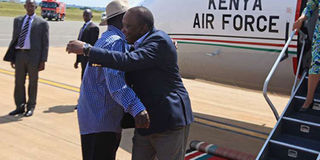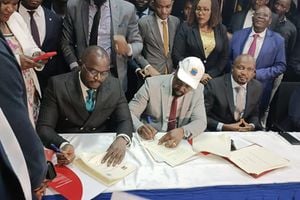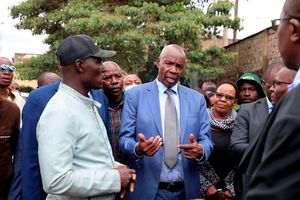Building Bridges effort holds key to Kenya’s long-term stability

ODM leader Raila Odinga (left) welcomes President Uhuru Kenyatta for his Nyanza tour after landing at Kisumu International Airport on December 13, 2018. The unity deal aims to bring peace and prosperity. PHOTO | FILE | NATION MEDIA GROUP
What you need to know:
- Even in future elections, without reforms, about half of the electorate — and country — will be left feeling excluded from the citadel of national power.
- In a country with a history of ethnic antagonism and complicated regional and ethnic relations, this is a clear obstacle to national cohesion.
There is no question that the key political event of 2018 was the March 9 ‘Handshake’ between President Uhuru Kenyatta and Opposition leader Raila Odinga.
One could gauge the seismic impact the political truce had by the scale of global coverage it received and the excitement it generated.
Here were two leaders who, in an unusually long drawn-out electoral drama, were engaged in a bitter fight for the presidency and the supporters of each were, literally, at daggers drawn with the rival camp in many parts of the country.
Many were worried about the future of the nation.
Still, the duo summoned the grace, humility and, most critically, the sense of statesmanship to assess that the status quo was unsustainable.
EFFORT
In agreeing to bury the hatchet and chart a new path for Kenya that prevents repeated rounds of near-existential crises during elections, President Kenyatta and Mr Odinga showed the African continent that elections do not have to divide and tear apart societies.
They also showed that there is a middle ground — which involves getting everyone on board and seeking to use the political process to advance rather than thwart efforts to achieve a united and functional nation.
Still, the huge political capital built up by the ‘Handshake’ will fizzle away if all the stakeholders do not work quickly to take advantage of the goodwill generated by the Kenyatta-Odinga working arrangement.
While 2018 was a year in which the country recovered after the hectic events — and two presidential elections of 2017 — this new year, 2019, should be one in which all work together to ensure concrete reforms so that divisive, do-or-die elections are put in the past.
REFORMS
There is a clear model Kenyans can look to for post-conflict reforms designed to foster stability.
Between 2008 and 2010, citizens from all walks of life came together to back the constitutional reform, which yielded the progressive charter that was endorsed by a clear majority of voters in a referendum in August 2010.
The reform was made possible by the unity that existed between President Mwai Kibaki and Prime Minister Odinga when the pair showed considerable statesmanship by pulling the country back from the brink after the 2007/2008 post-election violence.
The benefits of the reforms implemented — including devolution and the Bill of Rights — are clear. The Kenyatta-Odinga compact should, likewise, not be wasted.
Most fair-minded political commentators will admit that, while the 2010 Constitution is clearly progressive and one of the best on the continent, the framers of the supreme law of the land did not anticipate that the executive arrangement they proposed — basically a pure presidential system — would yield bitterly contested elections that leave the country terribly divided.
DIVISIVE
Kenya is unique in the region because it has extremely competitive elections.
While the stiff competition this yields is healthy, it can also be very divisive. The outcome is predictable.
Even in future elections, without reforms, about half of the electorate — and country — will be left feeling excluded from the citadel of national power.
In a country with a history of ethnic antagonism and complicated regional and ethnic relations, this is a clear obstacle to national cohesion.
To their credit, President Kenyatta and Mr Odinga did not just stop at the ‘Handshake’; they laid the foundation for a task force to collect the views of Kenyans on the necessary reforms to advance the quest for a stabler, more inclusive, united and, thus, prosperous Kenya.
POTENTIAL
This year will be an extremely important one for the Building Bridges Initiative, as that task force is called.
It will be a golden chance to quickly build on the momentum created by the handshake and educate Kenyans on the opportunity for progress that now exists.
The BBI team should move quickly, heeding the clear call of the principals, to synthesise the views of Kenyans and lay out a road map for long-term reform of Kenya’s contested politics — including through a referendum, if necessary.
Ms Benyawa is a freelance journalist. [email protected]





